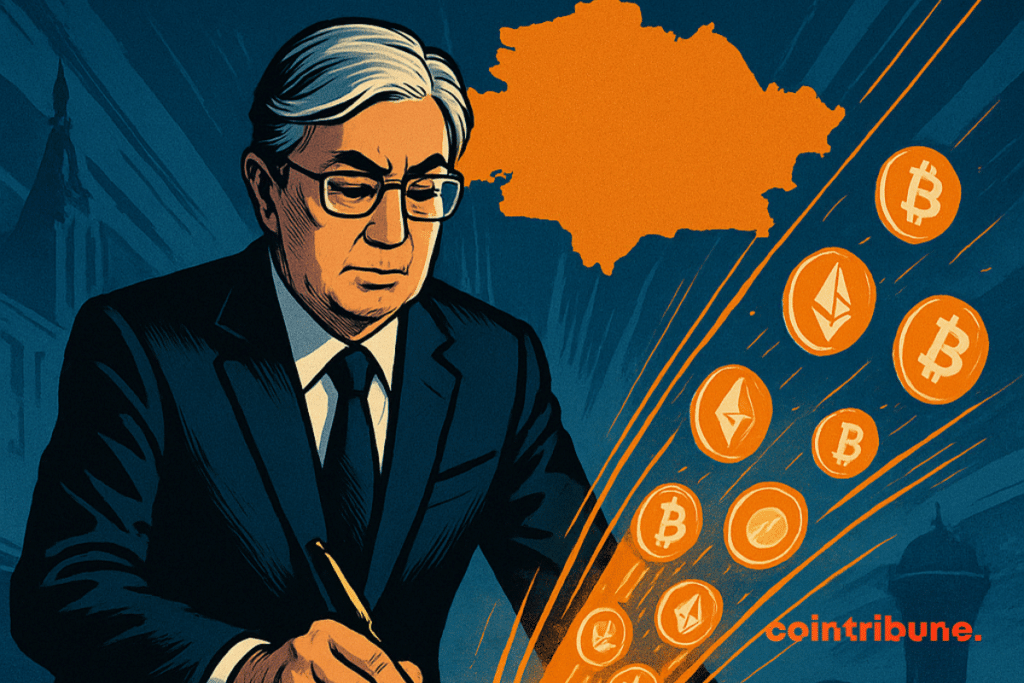Kazakhstan Officializes the Creation of a National Crypto Reserve
While most nations are still hesitant to take the step, Kazakhstan is accelerating. Its president, Kassym-Jomart Tokayev, has just announced the creation of a national cryptocurrency reserve, accompanied by a clear call to build a true ecosystem of digital assets. A bold decision for this Central Asian country, already a major player in global mining.

In Brief
- The president of Kazakhstan wants to create a national cryptocurrency reserve to strengthen the country’s financial sovereignty.
- This strategy is accompanied by a liberalization of the legal framework and massive investments in fintech and advanced technologies.
- Kazakhstan now aims to become a model of crypto governance, like the United States.
A Crypto Reserve to Anticipate the Finance of Tomorrow
The idea is not symbolic, it is strategic. Tokayev wants the State itself to accumulate a reserve of cryptos considered promising, in order to diversify national holdings. This fund, entrusted to the National Bank Investment Company of Kazakhstan, is to become a pillar of the country’s future financial system.
In his speech, the president emphasized that this initiative is part of a long-term vision: to protect against traditional market fluctuations and secure a strong position in the new digital economy. In other words, Astana wants to transform cryptos into a sovereign asset, just like gold or foreign currencies.
But the crypto reserve is not an end in itself. It is accompanied by a broader plan aiming to integrate these assets into daily economic life, complementing the Digital Tenge, already used to finance certain public projects.
Liberalization and Legal Framework: A Turning Point for Astana
One of Tokayev’s key messages: Kazakhstan must modernize its banking legislation to attract more players from the crypto and fintech sectors. The president is pushing for a law capable of fostering competition and liberalizing the flow of digital assets.
Such a shift would mark a clear break with the country’s initially strict approach. For a long time, crypto miners were only allowed to sell their tokens via approved local platforms. Now, trading could open to other authorized exchanges, multiplying opportunities for investors and businesses.
This liberalization is not only regulatory, but also financial. The president calls to mobilize up to 1 billion dollars to boost the high-tech and fintech sectors. A strong signal, reflecting Astana’s will to transition from a mining hub to a full crypto power.
From Massive Mining to a National Strategy
If Kazakhstan can afford this turn, it is because it has already acquired a central role in the global crypto landscape. Since China banned mining in 2021, the country has welcomed a massive share of relocated miners, benefiting from its abundant energy resources.
But this success has also revealed limits: fragile electrical infrastructure, lack of clear regulation, and tensions with the population. The government seems to have learned the lessons. Today, it wants to transform this blessing into a sustainable opportunity, by better regulating the sector while making it more attractive for foreign capital.
Astana thus sends a message to the rest of the world: far from suffering crypto, it wants to tame it. By creating a national reserve and easing the rules of the game, Kazakhstan hopes to position itself as a regional pioneer and, perhaps, as a future model of crypto governance. Like in the United States, where the OCC has authorized American banks to hold digital assets.
Maximize your Cointribune experience with our "Read to Earn" program! For every article you read, earn points and access exclusive rewards. Sign up now and start earning benefits.

Fascinated by Bitcoin since 2017, Evariste has continuously researched the subject. While his initial interest was in trading, he now actively seeks to understand all advances centered on cryptocurrencies. As an editor, he strives to consistently deliver high-quality work that reflects the state of the sector as a whole.
The views, thoughts, and opinions expressed in this article belong solely to the author, and should not be taken as investment advice. Do your own research before taking any investment decisions.